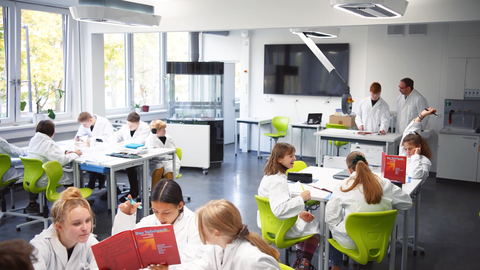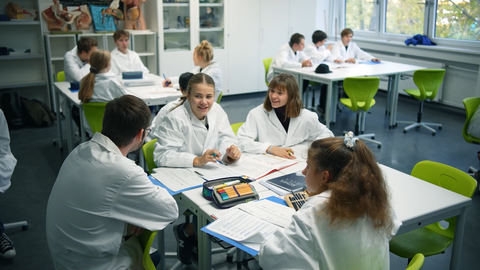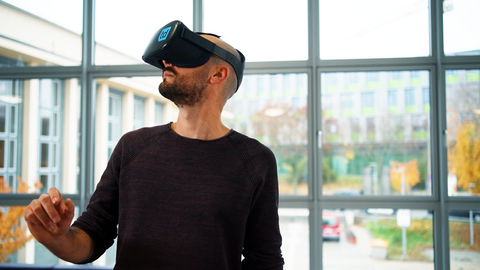Jan 05, 2023
No grades, less lecture-style teaching, more digital: What will school look like in the future?
Outdated teaching methods, sluggish digitalization, little individualized support: Criticisms of the school system in Germany are many. Researchers at TU Dresden are currently seeking ways to improve it. The University School is developing new forms of learning, the CeTI Cluster of Excellence is experimenting with the use of digital learning tools and the Chair of Psychology of Learning and Instruction is exploring the question of how pupils can be better motivated.
Even the education of future teachers is under discussion. “We face the challenge of educating teachers to prepare their students for the next century,” acknowledges Professor Rolf Koerber from the Institute of Vocational Education and Vocational Didactics. Today’s teachers have pupils who will end up living well beyond the year 2100. The goals of the teacher training degree program are therefore to make students aware of this fact, to encourage them to regularly reflect on themselves and their methods, and to motivate them toward continuous development. High-quality and professional project work as well as classroom management are aspects of didactics that garner much higher priority and attention in the teacher training degree program now than ever before.
At the University School Dresden, this has long been a part of everyday business. The entire project, piloted by the City of Dresden and TU Dresden, began in the 2019/20 school year as a public school operated by local authorities. At present, a Gemeinschaftsschule – a school form allowing for the joint learning of all students – with grades 1 through 12 is in the making. Professor Anke Langner was central to the planning of the University School research project and can explain what sets it apart from other schools. “Lessons revolve around projects. That means that the children explore a research question and learn in the process to structure their work and internalize knowledge acquisition methods,” the educational researcher explains. While pupils investigate a topic primarily independently, but with the support of teaching staff, they also ascertain technical expertise.
The University School differs from other schools in other aspects as well. For example, the pupils do not have set school breaks, but rather can take vacation throughout the year. Also, classes are spread throughout the entire day, allowing pupils to work at a more thoughtful pace. And there are no grades. “Which does not mean that no feedback is given,” Anke Langner clarifies. Pupils’ progress is also carefully monitored at the University School. “If a grading system is not sufficiently transparent, this can harm pupils’ learning,” Professor Susanne Narciss says. The psychologist therefore urges teachers to provide clear criteria and feedback that allow pupils to understand how they can improve their work.
The University School greatly values digital tools for knowledge transfer. In addition to reading, writing and arithmetic, digital literacy is included as the fourth cornerstone of education. Katharina Porepp from the CeTI Cluster of Excellence knows how this can work. According to her, schools in Germany are about 20 years behind when it comes to digitalization. However, she is certain that the classroom of the future will include increased digital media. Tablets with styluses or VR headsets make lessons much more interactive. “We only retain about 10 percent of what we read, but we can retain 90 percent of what we actually experience,” says Katharina Porepp. VR headsets can generate immersive learning experiences. This illustrates more clearly the size proportions of the universe, mathematical planar calculations and other abstract content, making it easier to comprehend.
“However, the central motor for learning is that we observe and discover new things,” psychologist Susanne Narciss clarifies. If teachers treat mistakes as opportunities to learn instead of as failures, this can help motivate pupils to learn. While “one-size-fits-all” strategies and conventional lecture-style classes can ruin pupils’ motivation to learn, new didactic approaches, innovative teaching plans and increased digital support can increase the incentive to learn.
More detailed information about the school of the future can be found in the latest episode of “Gute Frage” (Good question) on our “TU Dresden entdecken” (Discover TU Dresden) YouTube account.
Contact:
Prof. Rolf Koerber
Institute of Vocational Education and Vocational Didactics
Tel: +49 351 463-42333
Email:
Prof. Anke Langner
Project Head of the University School Dresden
Tel: +49 351 463-32235
Email:
Prof. Susanne Narciss
Chair of Psychology of Learning and Instruction
Tel.+49 351 463-36059
Email:



